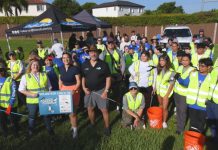|
Getting your Trinity Audio player ready...
|
COVID-19 is on the run. Miami Beach and our entire economy is awakening from hibernation. The headlines should be touting South Florida as a tropical paradise, enticing folks who have been sheltering in place to come on down. The news of late from South Florida has been anything but welcoming.
Early on May 30th, three gunmen in ski masks and hoodies ambushed a crowd leaving a a concert at a club in Miami Gardens killing two and injuring 20 others. News outlets around the world picked up the story, one of too many about gun violence in South Florida.
Three gunmen were captured on surveillance footage getting out of a white SUV and then quickly returning and driving off. The car was stolen and was later found ditched in a canal.
Marcus Lemonis, CEO of Camping World and host of “The Profit” on CNBC, has offered a reward of $100,000 and was quoted in the Miami Herald as saying he wanted “to help authorities in my hometown…arrest and convict the suspects.”
Just about 24 hours before, gunmen opened fire on a crowd in Wynwood, killing one person and injuring seven. A reward of $30,000 was put up to find those gunmen.
So far, no one has claimed the reward in either case by turning in the suspects.
If we want to encourage public participation and help in apprehending these cowards, South Florida needs to start stepping up its game.
The Crime Stoppers group was first begun in Albuquerque, New Mexico in July 1976. A night filling station attendant was killed and after two weeks with no leads, this newly formed group offered a reward of $1,000. Someone called in a tip anonymously and a suspect was arrested and later convicted.
It was a good concept, but one that doesn’t seem to be working lately. Why?
The kind of reward that Lemonis and others are offering lately are the exception rather than the rule. People value their lives and safety. A reward of $1,000 in 1976 is equivalent in purchasing power to about $4,700 today and even that number is too low. Nobody’s life is going to significantly change for $4,700.
Low reward amounts don’t give someone with information to trade enough capital to move themselves and their families out of harm’s way. That’s why there are a lot of people out there who may have seen something, but refuse to say something.
It’s just not worth the risk.
We need the big money movers in South Florida — the hotel and restaurants, the malls, and all of the tourist venues — to be ready to pony up some serious cash. I’m talking life changing kinds of money. We should have a reward fund of several million dollars banked and ready to be distributed.
Let’s face it. A headline that talks about a mass shooting is never good. But a follow-up news story about how the gunmen were caught quickly based on a community tip can help balance the news scales.
Otherwise, the story of one more mass shooting will get out to our prospective tourists, turning them off of a South Florida vacation. The choice is in the hands of the people who will most likely benefit from a return to a normal tourism industry.
Or, we could let things continue on the same path they’re on. The best that South Florida’s public relations response to these unsolved massacres may be reduced to a pathetic tag line:
“Come back to Miami. The shooting has stopped. … For now.”





